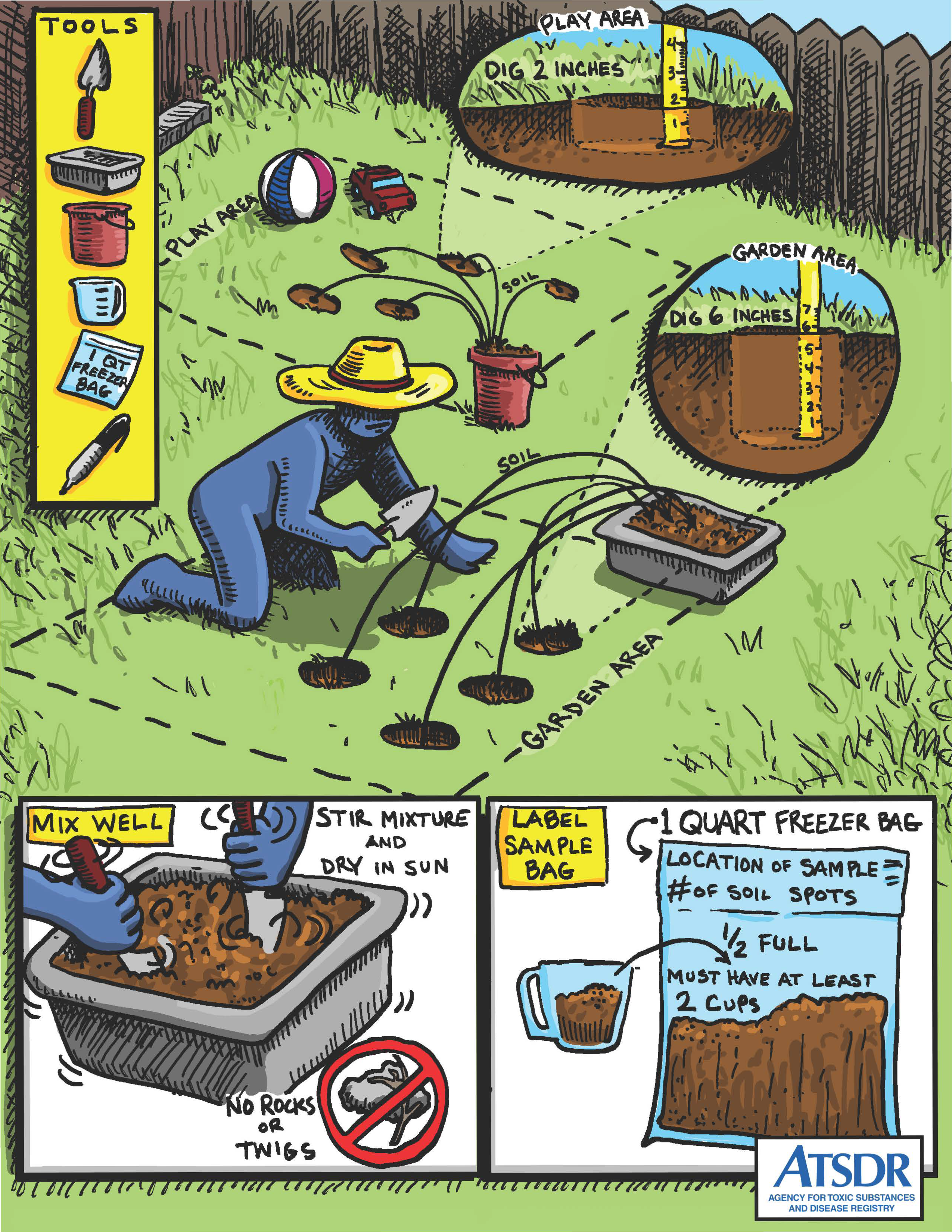
Join us for a free soil lead screening of your garden soils. Any and all gardeners in Vermont are invited -- bring your soil sample (see instructions below) and walk on in -- no need to pre-register. These events are free and open to the public. Special thanks to the Friends of the Hort Farm and Rutland Chapter Extension Master Gardeners for hosting us!
Upcoming Soil Lead Screenings
Saturday, May 25, 2024
10 a.m. to 2 p.m.
UVM Horticulture Research Center
65 Green Mountain Drive
South Burlington, VT
**In collaboration with the Friends of the Hort Farm annual Bloom Time Festival
Saturday, June 1, 2024
9 a.m. to 12 noon
Godnick Adult Center
1 Deer Street
Rutland, VT
**In collaboration with the Rutland Chapter Extension Master Gardener annual Plant Sale
How to Take a Soil Sample for Lead Screening
 Follow the steps below to collect your Soil Sample.
Follow the steps below to collect your Soil Sample.
It's a good idea to wear garden gloves when you are collecting your soils.
Step 1: Identify the area for your soil sample.
Plan to collect samples from areas with vegetable/edible plants only (no need to sample ornamental gardens). Soil from a large garden can be collected as one sample. If you have multiple, separate edible gardens in different locations, sample them separately. Limit of 3 sample bags/person.
Step 2: Collect Soil.
To collect soil, you will want to dig from the surface down to 6 to 8 inches deep.
For a large area, collect soil from 5 to 10 random spots throughout the area, and combine in a clean container.
For a small area, collect soil from 3 random spots and combine in a clean container.
Step 3: Mix soil well in clean container.
Step 4: Remove pebbles, rocks, and roots, and air dry.
Do not use a flame, oven or hairdryer to dry the soil!
Step 5: Transfer 1 to 2 cups of the mixed soil into a clean one-quart Ziplock bag.
Note: For more than one sample, repeat steps 1-5. Rinse your container between samples. Limit of 3 sample bags/person.
Facts about Lead & Human Health
See the info sheet distribution as this event: Lead (Pb) Health Resources for Further Information
Lead can cause health problems in almost every organ and system in your body -- to keep you and your family safe, we are conducting this free soil lead screening.
This Soil Screening, Health, Outreach, and Partnership (soilSHOP) event provides community members with free lead screening of soil gathered from their gardens. Through soilSHOPs, ATSDR and partner organizations provide health education and outreach to help people learn if their soil is contaminated and how to reduce exposures.
Did You Know?
Lead is common in both urban and rural settings.
Lead poisoning is a preventable disease.
There is no known safe level of exposure to lead.
Avoid exposures to all sources of lead.
What is Lead?
Lead is a naturally occurring bluish-gray metal found in small amounts in the earth's crust. Lead can be found in all parts of our environment. Much of it comes from human activities including burning fossil fuels, mining, and manufacturing. Lead has many different uses. It is used in the production of batteries, ammunition, metal products (solder and pipes), and devices to shield X-rays. Because of health concerns, lead from gasoline, paints and ceramic products, caulking, and pipe solder has been dramatically reduced in recent years. (Thank you to the Agency for Toxic Substances and Disease Registry -- ATSDR -- for providing this information.)
Gardening Resources
Visit our Gardening Resources page to find information on a wide range of gardening topics.
ATSDR also has a list of resources pertaining to Soil, Gardening, and Your Health on their website, including information on lead and safe gardening.
Questions?
Please contact Deb Heleba at debra.heleba@uvm.edu with your questions about this event.
If you have gardening and soil testing questions, please reach out to our Garden Helpline at: go.uvm.edu/gardeninghelp.
Issued in furtherance of Cooperative Extension work, Acts of May 8 and June 30, 1914, in cooperation with the United States Department of Agriculture. University of Vermont Extension, Burlington, Vermont. University of Vermont Extension, and U.S. Department of Agriculture, cooperating, offer education and employment to everyone without regard to race, color, national origin, gender, religion, age, disability, political beliefs, sexual orientation, and marital or familial status. Any reference to commercial products, trade names, or brand names is for information only, and no endorsement or approval is intended.




